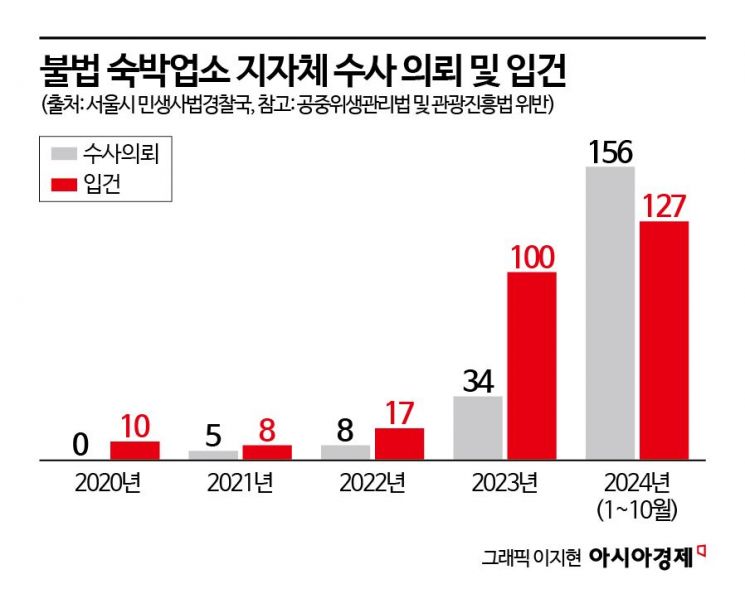127 cases reported for illegal lodging business this year
Significant increase since the COVID-19 pandemic
On the 25th, in front of an officetel in Donggyo-dong, Mapo-gu, Seoul. Five or six people speaking Chinese came out of the elevator. When asked where they were staying, they responded that they had reserved a room in the officetel. Mei Tin (30), a traveler from Taiwan, said, “I was looking for accommodation where my group could stay together, and this was the cheapest place, so we booked it on Airbnb.”
After observing the officetel for about an hour, we found that people who appeared to be foreign travelers frequently entered and exited the building. In fact, there are many posts on Airbnb, a lodging sharing service platform, offering rooms for rent in the building. Mr. Lee (32), the owner of a nearby hostel, said, “Because they are competitors to us, I think it is right to crack down on people who are making money illegally.” “I’ve never heard of it,” he lamented.
On the 25th, a group of foreign tourists standing in front of the entrance of an officetel in Donggyo-dong, Mapo-gu, Seoul. Reporter Shim Seong-ah
View original icon
According to the Seoul Metropolitan Police Agency, there were 156 requests to investigate illegal lodging businesses this year, and 127 cases were booked. In 2020, there were 0 requests for investigation and 10 cases filed, but the number increased significantly after the COVID-19 pandemic. However, compared to the more than 400 complaints related to illegal lodging establishments received in just three district offices in Seoul, including Mapo-gu Office, Jung-gu Office, and Dongdaemun-gu Office, this figure is woefully insufficient.
A hotel manager near Dongdaemun History and Culture Park Station in Seoul said, “I see a lot of places that are openly operating lodging businesses in officetels,” and pointed out, “If you put your mind to it, you can find illegal places, but it doesn’t seem like the crackdown is happening properly.” .
An employee of a residential lodging facility in Chungmuro, Jung-gu, Seoul said, “Leaving illegal lodging establishments as they are is a serious problem because it leads to tax evasion,” and added, “If an accident occurs at the lodging, compensation issues arise, which worsens the image of the area to foreigners. He expressed concern, saying, “In the end, it could cause harm to everyone.”

View original icon
In order to operate shared lodging, it must be a lodging business in accordance with the Public Health Management Act or comply with the standards for foreign tourism and urban lodging businesses targeting foreigners. Officetels and studio apartments do not meet all standards. If you operate in violation of the law, you will be subject to up to two years in prison or a fine of up to 20 million won. Each local government in Seoul is trying to inspect complaints, but it is not enough. Officials from each district office in Seoul complain of difficulties, saying, “There are many limitations due to a lack of manpower and no investigative authority.”
Jeong Ran-soo, an adjunct professor at the Department of Tourism at Hanyang University, said, “The biggest cause is a lack of manpower. Usually, there are only one or two public officials in charge of each local government and they have no investigative authority, so even when they go to the site, they do not open the door or the landlord says, ‘I invited someone I know without receiving money. “It is not easy to crack down on people who protest in this way,” he explained. He then advised, “It is necessary for not only local governments but also relevant government ministries to conduct a large-scale comprehensive investigation or actively review it using external services.”
Reporter Shim Seong-ah heart@asiae.co.kr
<ⓒ투자가를 위한 경제콘텐츠 플랫폼, 아시아경제(www.asiae.co.kr) 무단전재 배포금지>
Source: www.asiae.co.kr


